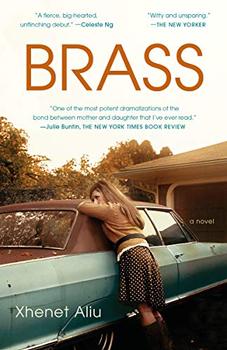Summary | Excerpt | Reviews | Beyond the Book | Readalikes | Genres & Themes | Author Bio

CHAPTER ONE
When the last of the brass mills locked up their doors and hauled ass out of town once and for all, it seemed all they left behind were blocks of abandoned factories that poked out from behind high stone gates like caskets floated to the surface after the Great Flood of? '55.
But that wasn't true. They also left my father's hands with nothing to callus them, those poor idle bastards that once upon a time abandoned a Korean Stratocaster knockoff in favor of a Bridgeport milling machine, and just like most love triangles, it turned out he chose wrong. It left my mother slumping over the assembly line at the Peter Paul Mounds and Almond Joy factory down the street in Naugatuck, where she sometimes felt like a nut but more often she felt like a highball. It left my sister, Greta, younger than me by two years but with test scores that painted me a remedial toddler by comparison, with a tic that made her pull out her hair until the white bald patches of her scalp shone through like flags of surrender.
And when the last of the brass mills locked up their doors and hauled ass out of town once and for all, they left me with a change jar that hadn't even gotten me close to the wicked coupe that was going to drive me out of Waterbury so fast I wouldn't even bother to burn the skid marks that would mark my goodbye.
What I got instead was a job at the Betsy Ross Diner, slinging poutine fries and spanakopita to third-shifters headed to or coming back from their jobs as hospital guards, machinists, small-time drug dealers. And I got Bashkim, an Albanian line cook at a Greek diner named after an American patriot.
I swear to Allah, you are the most beautiful girl I have ever seen. That's what Bashkim said to me after three weeks, when he finally looked up at me in the kitchen window for the first time. It was 1996, the middle of March, a brutal part of the year when spring was supposed to hit but didn't, when I'd given up on ever being warm again.
My being beautiful was about as likely as me ever wrapping my fingers around the leather steering wheel of a souped-up six, but for the first time since I'd started working there, clocking in seemed worth the sweatbox polyester uniform and jingle-change tips. My mother had warned me when I took the job to watch out for the Albanians who worked at the Ross, because she heard they treated their women like sacks and that their tempers ran hotter than the deep fryers in the kitchen, while the nice Lithuanian boys I should've been dating had the decency to ignore their women altogether and drink themselves silently to death in their garages. These Albanians, she'd say, shaking her head, they just speak Albanian to each other all the time. Her own parents barely spoke English but also didn't want their kids to learn Lithuanian, lest they be accused by their neighbors of being pinko bastards, so to her, open communication in any language was offensive and weird. But I was never one to take advice, and anyway, I figured she was talking about the teenage Albanians who jumped kids in the movie theater parking lot, or the middle-aged ones who choked me out of the dining room with the Marlboro Red smoke that leaked out of their mouths like cartoon thought bubbles. My mother wasn't talking about Bashkim. He was way worse than she could ever have known about, or she never would've lent me the money to buy the uniform.
I swear to Allah, you are the most beautiful girl I have ever seen.
Well hallelujah! or whatever the hell Muslims had to say about that. I might've had an Our Lady of Sorrows prayer card tucked into my wallet where the dollar bills were supposed to go, but I believed in Allah right then, because Allah believed in me. I'd been holding out hope that I wasn't really ugly, just a type of pretty that common people didn't get, and what was I surrounded by if not the common? But Bashkim, no way, he wasn't common. He'd lived halfway across the world, as far away from Waterbury as my grandparents once had. Albania. Europe. So it was Eastern Europe, with its dictators and Communism and plastic sandals worn with mismatched tube socks. No geography teacher ever taught us that Eastern Europe and Europe are not one place, not one people, not one neighbor lending sugar to the other. Anyway, the way my mother told it, Albanians were basically Arabs with a European mailing address, while we Lithuanians had had the good sense to be conquered by nice righteous Christian crusaders. Still, I was thinking that maybe Bashkim saw something familiar in me, something Old World and refined, despite the thousands of years of peasant stock that had culminated in the second-generation American plainness that was Elsie Kuzavinas. I thought maybe some of my grandparents' European blood still somehow coursed through my veins, despite forty-something years in Waterbury, Connecticut: Brass Manufacturing Capital of the World.
Excerpted from Brass by Xhenet Aliu. Copyright © 2018 by Xhenet Aliu. All rights reserved. No part of this excerpt may be reproduced or reprinted without permission in writing from the publisher.
He has only half learned the art of reading who has not added to it the more refined art of skipping and skimming
Click Here to find out who said this, as well as discovering other famous literary quotes!
Your guide toexceptional books
BookBrowse seeks out and recommends the best in contemporary fiction and nonfiction—books that not only engage and entertain but also deepen our understanding of ourselves and the world around us.